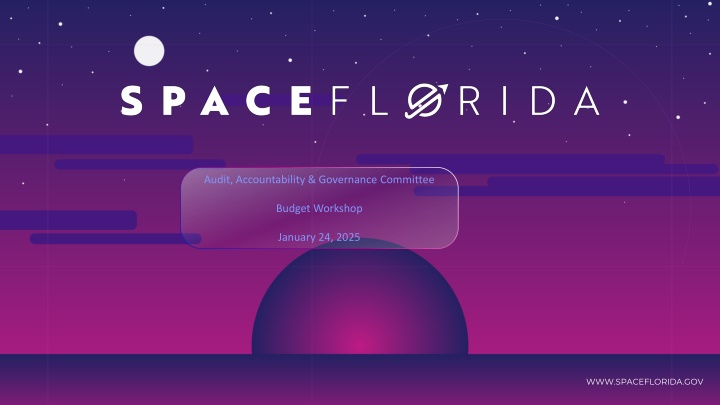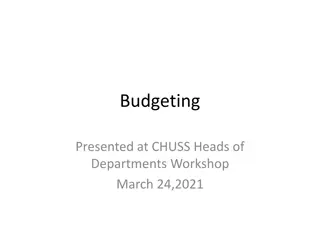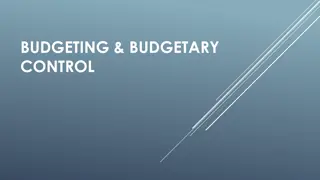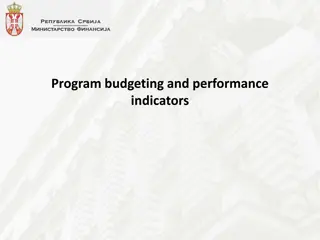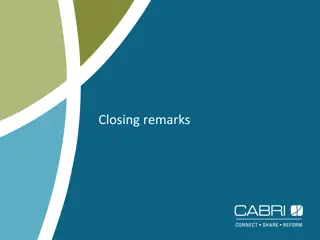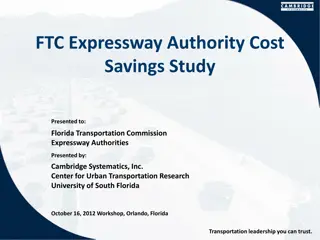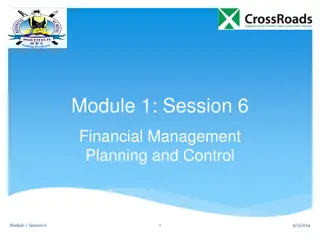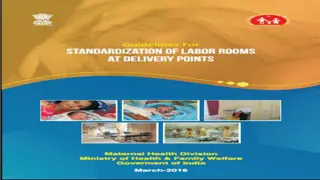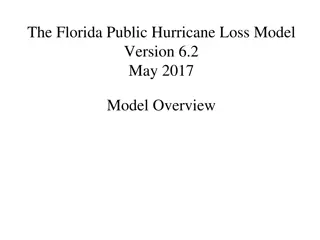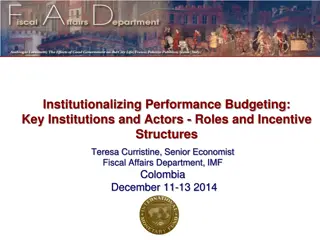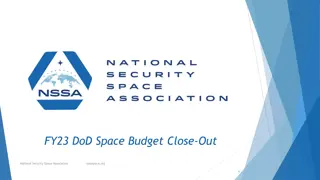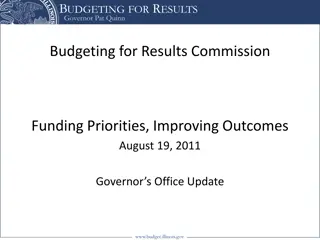Space Florida Budgeting Process Overview
This content provides a detailed overview of Space Florida's budgeting process, including the annual budget timeline, budget development process, and roles of various departments and committees in ensuring financial accountability and governance.
Download Presentation

Please find below an Image/Link to download the presentation.
The content on the website is provided AS IS for your information and personal use only. It may not be sold, licensed, or shared on other websites without obtaining consent from the author.If you encounter any issues during the download, it is possible that the publisher has removed the file from their server.
You are allowed to download the files provided on this website for personal or commercial use, subject to the condition that they are used lawfully. All files are the property of their respective owners.
The content on the website is provided AS IS for your information and personal use only. It may not be sold, licensed, or shared on other websites without obtaining consent from the author.
E N D
Presentation Transcript
Audit, Accountability & Governance Committee Budget Workshop January 24, 2025 WWW.SPACEFLORIDA.GOV
Space Florida Accounting Department Structure EVP, CFO & Corporate Administration Officer Manager Grant Administration & Reporting Controller Accountant III Accountant III Accountant- Accounts Payable & Accounts Receivable Staff Accountant Accountant- Accounts Payable & Procurement Analyst Accountant- Accounts Receivable
Annual Budget Annual Budget Process Timeline Process Timeline 1. Space Florida Submits LBR: Space Florida submits its Legislative Budget Request to the Department of Commerce (DOC) in July 2023, a full year before the fiscal year begins (FY 2025: July 1, 2024 June 30, 2025). Legislature Passes GAA Governor Issues Recommended Budget Governor Signs / Vetoes 2. DOC Submits LBR: The Department of Commerce submits the LBR to the Governor in September 2023, which includes recommendations for funding and priorities. 3. Governor s Recommended Budget: The Governor issues a recommended budget 30 days prior to the start of the legislative session, which typically begins in March. The recommended budget is based on the LBR submissions and other priorities. Agencies Submit Budget Requests State Agencies Implement 4. Legislature Passes General Appropriations Act (GAA): The Florida Legislature reviews, modifies, and passes the General Appropriations Act (GAA), which allocates funding for the state s operations. The GAA is typically passed before the end of the legislative session. Base Prepared For Next Cycle LRFO Issued 5. Governor Signs GAA: The Governor signs the General Appropriations Act into law, June, 24 completing the state budget process for the upcoming fiscal year. This timeline illustrates the critical steps in the budgeting process for Florida, involving both the executive and legislative branches.
Budget Development Budget Development Process Process 1. July - August 2024: SF Departments Provide Budget Input SF departments submit their budget inputs for the upcoming fiscal year, outlining expected expenses, revenue, and financial needs. Legislature Passes GAA 2. August - September 2024: Finance Compiles Budget Inputs The Finance team gathers and compiles all budget inputs from the departments. During this period, they ensure that the inputs align with financial constraints and organizational priorities. Budget Presented to BOD for Adoption Governor Signs / Vetoes 3. September 2024: Executive Team Reviews and Finalizes Budget The Executive Team reviews the compiled budget and makes final adjustments. They ensure the budget aligns with the organization s strategic goals for FY 2025. Space Florida Departments Provide Budget Inputs Budget Presented to AA&G Committee 4. October 2024: AA&G Committee Budget Presentation The Audit, Accounting, and Governance (AA&G) Committee reviews the finalized budget, ensuring compliance, accuracy, and alignment with governance standards. The Committee presents the budget to the Board. Finance Departments Complies & Reviews Inputs Executive Team Reviews and Finalize Budget 5. November 2024: Budget Adopted by Board of Directors (BOD) The Board of Directors (BOD) formally adopts the budget, making it the official financial plan for the fiscal year 2025 (October 1, 2024, to September 30, 2025). This timeline reflects a structured, multi-step process involving input from various departments, executive reviews, and oversight by the AA&G Committee and the BOD.
State Appropriations State Appropriations State Fiscal Year 25 Operations - $11.5 million SEED Trust Fund Recurring $5 million General Revenue Recurring Israel MOU - $1 million from SEED Trust Fund Recurring Financing - $6 million General Revenue Non-recurring State Fiscal Year 24 Operations - $11.5 million SEED Trust Fund Recurring Israel MOU - $1 million from SEED Trust Fund Recurring Financing - $8.5 million General Revenue Non-recurring
Budget Fiscal Year 2025 Budget Fiscal Year 2025 Budget Fiscal Year 2025 October 1, 2024 to September 30, 2025 In 000's Total Budget Operating Revenues State Appropriated Revenue - OPS $ 16,500 Significant Budget Changes for Fiscal Year 25 Budget Other Revenue $ 3,865 Total Operating Revenues $ 20,365 State Appropriations increase of $5 Million Operating Expenses Salary & Other related costs increase of $6.3 million Salaries & Other Related Costs $ 12,334 Contract & Subcontract Services $ 1,195 Utilities & Maintenance $ 4,110 Travel & Entertainment $ 418 Business Recruitment & Investment $ 543 General & Administrative Total Operating Expenses (Excluding Depreciation) $ 1,765 $ 20,365 Change in Net Assets Due to Operations $ 0
Recruitment Update Recruitment Update New Hires January 2024 - February 2025 (14) Hire Date Property Manager Manager Business Development - EDC Facilities Manager Building Official IT Systems and Support Specialist Director, Safety and Compliance Accountant III VP Project Finance & Capital Programs Director Business Development Policy Analyst Accountnat-Accounts Payable IT Systems Administrator General Counsel VP Advanced Programs January 3, 2024 February 5, 2024 February 19, 2024 March 11, 2024 April 22, 2024 September 23, 2024 September 30, 2024 November 4, 2024 November 18, 2024 December 16, 2024 January 21, 2025 January 27, 2025 February 3, 2025 February 3, 2025 Current Openings (4) IT Cybersecurity Specialist IT Helpdesk Technician Project Manager Project Engineer
Budget Comparison Budget Comparison Fiscal Year 2024 and 2025 Budget Comparison Unaudited In 000's FY24 Total Actuals & Commitment s FY24 Budget to Actual Variance FY24 to FY25 Budget Variance FY24 Budget Total FY25 Budget Total Operating Revenues State Appropriated Revenue - OPS Other Revenue Total Operating Revenues $ 11,500 $ 11,500 $ - $ 16,500 $ (5,000) $ 3,896 $ 4,184 $ (288) $ 3,865 $ 31 $ 15,396 $ 15,684 $ (288) $ 20,365 $ (4,969) Operating Expenses Salaries & Other Related Costs Contract & Subcontract Services Utilities & Maintenance Travel & Entertainment Business Recruitment & Investment General & Administrative Total Operating Expenses (Excluding Depreciation) $ 6,048 $ 5,693 $ 356 $ 12,334 $ (6,286) $ 1,180 $ 913 $ 267 $ 1,195 $ (15) $ 4,524 $ 4,172 $ 352 $ 4,110 $ 414 $ 330 $ 401 $ (71) $ 418 $ (88) $ 600 $ 353 $ 247 $ 543 $ 57 $ 2,714 $ 2,555 $ 159 $ 1,765 $ 949 $ 15,396 $ 14,088 $ 1,309 $ 20,365 $ (4,968) Change in Net Assets Due to Operations $ - $ 1,597 $ (1,597) $ - $ -
Pipeline In Labor Hours Pipeline In Labor Hours High Priority Projects: 22,300 labor hours Total Labor Hours for Projects: 164,000 Medium Priority Projects: 71,000 labor hours Note: Does not include Selling, Spaceport operations, and Corporate Operations.
Budget Management Process Budget Management Process 1. Real-Time Monitoring of Approved Budgets: The Controller and CFO are responsible for monitoring the approved budgets in real time. This ensures that spending aligns with budget expectations and any discrepancies can be addressed promptly. 2. Quarterly Budget Forecasts: Every quarter, budget forecasts are prepared, likely based on updated financial data and any anticipated changes in revenue or expenses. 3. Quarterly Executive Team Meeting: The executive team meets quarterly to review actual financial performance against the approved budget and forecasts. This allows for strategic decision-making based on the financial health of the organization. 4. AA&G Committee Review: The AA&G (Audit, Accountability, and Governance) Committee reviews the quarterly interim financial statements. Based on their analysis, they recommend the interim statements for approval by the board. This structure ensures continuous oversight, transparency, and accountability in financial management.
Open Discussion Open Discussion Next
Adjourned Adjourned WWW.SPACEFLORIDA.GOV
